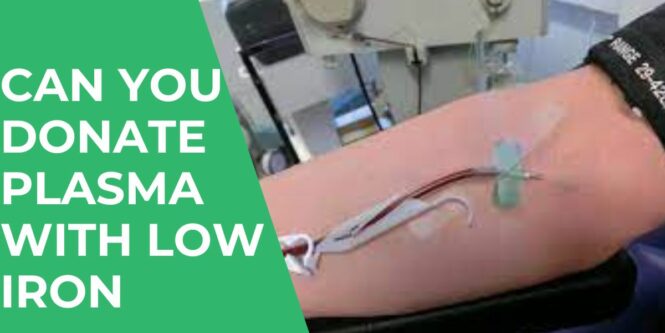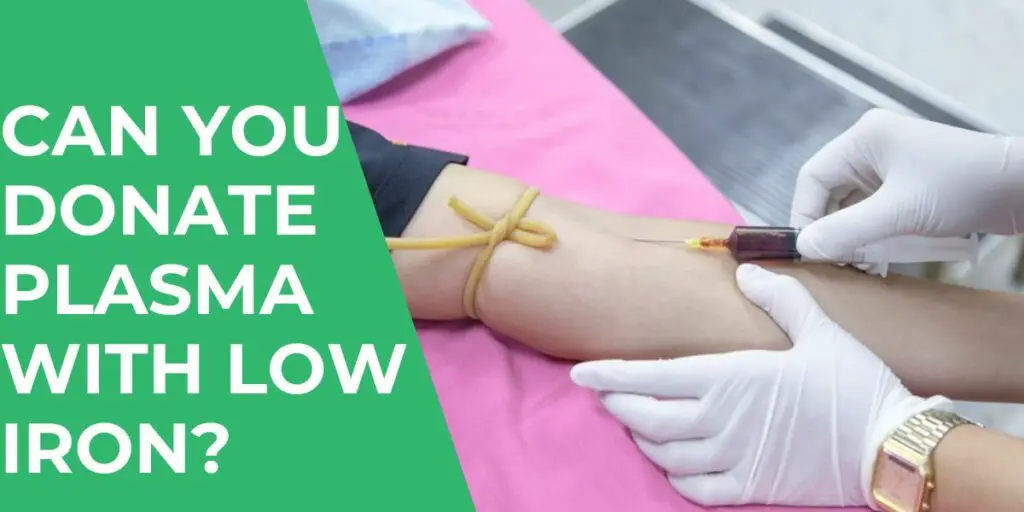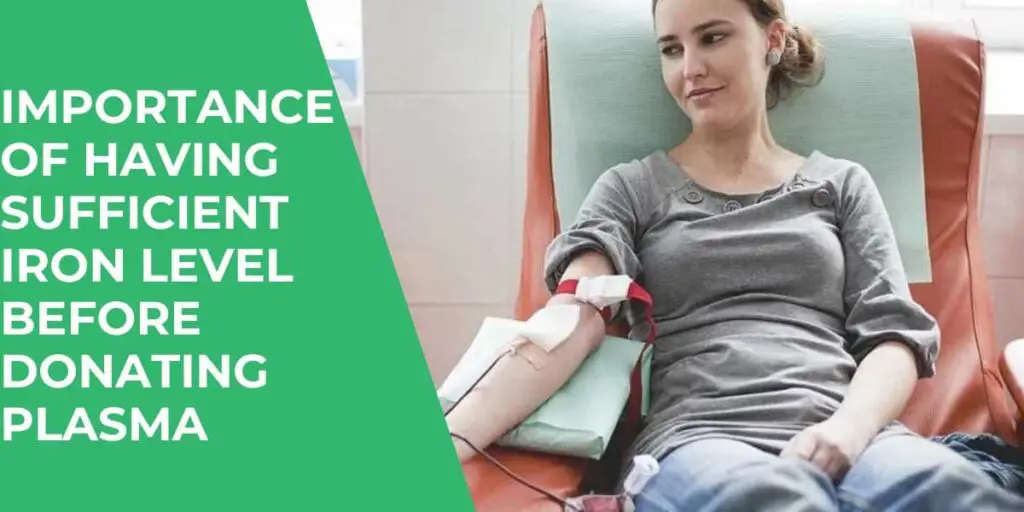
There I was, sitting in the donation center, feeling proud about my decision to give plasma and help save lives.
Then, the nurse frowned at the screen and broke the news: my iron levels were too low.
I was shocked and disappointed, wondering if I could still donate plasma despite my low iron.
Today, we’re going to dive into this critical topic and answer the question: Can you donate plasma with low iron, what are the required iron levels, and how to fix the problem.
Can You Donate Plasma With Low Iron?

You may donate plasma with slightly low iron levels if you’re not anemic. However, donation centers will check your hemoglobin and health parameters to ensure safety. If your iron levels are very low, you’ll need to wait and improve them before donating.
Curious about other factors affecting plasma donation? Discover what happens when your protein levels are too high to donate plasma in this article.
Plasma Donation and Iron Requirements
The plasma donation and iron requirements include the following:
- Minimum hemoglobin level: Plasma donation centers require a minimum hemoglobin level for donors. The minimum hemoglobin level is 13.0 g/dL and 12.5 g/dL for male and female donors.
- Minimum hematocrit level: Plasma donation centers also typically require a minimum hematocrit level of 38% for female donors and 39% for male donors.
- Iron-rich diet: An iron-rich diet is essential to maintain healthy levels before and after plasma donation. Some of the Iron-rich foods include red meat, poultry, seafood, and beans. There are also nuts, fortified cereals, and bread.
- Iron supplements: It is important to take iron supplements If you have low iron levels. This will help increase your iron levels so you can donate plasma.
- Wait between donations: Donors should wait at least eight weeks between plasma donations to allow their bodies to recover fully and replenish their iron levels.
Curious about how donating plasma might impact your fitness goals? Don’t miss our related article on Does Donating Plasma Affect Muscle Growth to learn more about the connection between the two.
What is the Required Iron Level for Plasma Donation?
The required iron level for plasma donation is at least 12.5 g/dL and 12.0 g/dL for male and female donors. However, this can vary slightly depending on the donation center and individual circumstances.
When is the Iron Level Low for Plasma Donation?
The iron level is low for plasma donation when it falls below 12.5 g/dL for men and below 12.0 g/dL for women.
For detailed information on preventing scarring as a plasma donor, read my article Does Donating Plasma Leave Scars.
Importance of Having Sufficient Iron Level Before Donating Plasma

The importance of having sufficient iron level before donating plasma include:
- To avoid the risk of anemia: Plasma donation can temporarily decrease your iron levels. If you already have low iron levels, this can lead to anemia.
- Ensure your comfort: Low iron levels can make you feel fatigued and weak, affecting your ability to donate plasma safely and comfortably.
- Meet donation center guidelines: to ensure the safety of both the donor and the recipient of the plasma, donation centers have strict rules for iron levels. If your hemoglobin levels are too low, you may be turned away from donating plasma.
What Happens if You Donate Plasma with Low Iron?
If you donate plasma with low iron, you may experience several side effects or complications, such as fatigue, dizziness, weakness, or even fainting. This is because your body may struggle to transport adequate oxygen to your cells, which is crucial for maintaining your overall health.
Furthermore, donating plasma with low iron levels could potentially exacerbate an existing iron deficiency. It’s important to consult with the plasma donation center and follow their guidelines to ensure a safe donation process.
Understanding Iron Deficiency
Iron deficiency happens when your body doesn’t have enough iron. Iron is a vital mineral that helps the body produce hemoglobin.
The body can’t produce enough hemoglobin without sufficient amounts of iron. This shortage of hemoglobin can lead to anemia, weakness, and shortness of breath.
Iron deficiency has many possible causes, including poor diet, blood loss or injury, gastrointestinal conditions that affect iron absorption, and certain medications.
The good news is that you can treat an iron deficiency. The most common treatment is to take iron supplements. Eating a diet rich in iron is also essential. Introducing red meat, poultry, seafood, and vegetables into your diet can help your iron level.
How to Increase the Iron Level for Plasma Donation
Here are some tips for increasing your iron levels for plasma donation:
- Eat a diet that is rich in iron: Good sources of iron include red meat, seafood, beans, and poultry. You can also add tofu, spinach, and other vegetables.
- Consider taking an iron supplement: Consult your doctor before taking any supplements to ensure they’re safe.
- Avoid consuming foods or drinks that can interfere with iron absorption: For example, calcium can reduce the amount of iron your body absorbs, so it’s best to avoid consuming calcium-rich foods or supplements at the same time as iron-rich foods or supplements.
- Get enough vitamin C: Vitamin C can help your body absorb iron, so try to include plenty of vitamin C-rich foods, such as citrus fruits, strawberries, kiwi, and bell peppers.
- Take breaks between donations: Donating plasma can deplete your iron levels, so giving your body time to recover between donations is important.
Is Taking Iron Pills Before Donating Plasma Recommended?
Taking iron pills immediately before donating plasma is not typically recommended. To ensure donor safety and maintain plasma quality, it’s best to consistently maintain healthy iron levels through a balanced diet and supplements if needed, rather than relying on a single iron pill before donation.
FAQs on Can You Donate Plasma with Low Iron
These are the most frequently asked questions on Can You Donate Plasma with Low Iron:
Can I Donate Plasma if I Take Iron Supplements?
You can donate plasma if you take iron supplements if your iron levels are within the acceptable range. However, to ensure that plasma donation is safe for you, talk to your doctor.
What Level of Iron is Safe for Plasma Donation?
The acceptable iron range for plasma donation, is 13.0-18.0 g/dL and 12.5-17.0 g/dL for males and females. However, this can vary depending on the donation center, so checking with them for their specific requirements is important.
How Long Will It Take to Increase My Iron Level?
It takes several weeks to a few months of taking iron supplements to see an improvement in your iron levels. This also applies to an iron-rich diet.
Can Plasma Donation Cause Anemia?
Plasma donation can temporarily decrease your iron levels, but it’s unlikely to cause anemia. However, frequent plasma donations can lead to low iron levels over time. It’s important to maintain healthy iron levels and take breaks between donations.
Can You Donate Plasma if You Are Anemic?
You cannot donate plasma if you are anemic. Plasma donation centers require donors to have adequate hemoglobin levels to ensure their safety and maintain the quality of the donated plasma.
Can I take an iron pill before donating plasma?
Taking an iron pill before donating plasma might help increase your iron levels, but it’s not a guarantee that you’ll be eligible to donate.
Conclusion
If you have low iron levels and are considering donating plasma, increasing your iron levels first is important. Eating an iron-rich diet, taking supplements, and avoiding foods and drinks interfering with iron absorption can help you achieve healthy iron levels.
It is possible to donate plasma with low iron levels if your hemoglobin levels are within the acceptable range. It is also important to note that frequent plasma donations can lead to low iron levels over time.
I hope you now have the answer to Can You Donate Plasma with Low Iron.
Talk to your doctor before donating plasma to ensure it is safe for you. Furthermore, take breaks between donations to allow your body to recover. By prioritizing your health and well-being, you can ensure a safe plasma donation.

